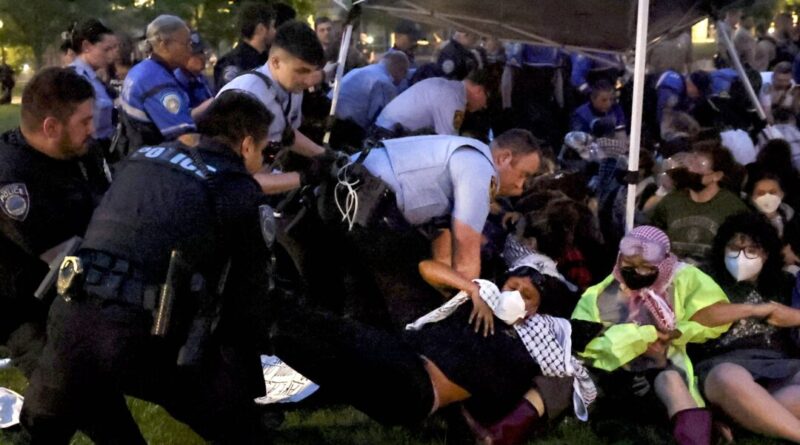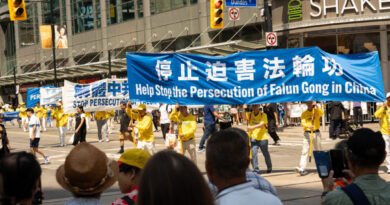Police and Universities Remove Encampments and Detain Pro-Palestinian Protesters on Campus
Protesters are calling for schools to sever all financial connections with Israel and to divest from companies they believe are supporting the conflict in Gaza.
Students at various college campuses across the United States, who have been demonstrating against the Israel-Hamas conflict, stood their ground as the police attempted to disperse them, resulting in the arrest of dozens of protesters.
The protesters are urging the schools to end all financial ties with Israel and to divest from companies they claim are contributing to the conflict.
Since the protests began, Jewish students and faculty have reported instances of anti-Semitic behavior that have left them feeling unsafe on campus.
According to a statement by Columbia University in New York City on April 27, students and administrators have initiated discussions.
“Dialogue between university officials and student organizers is ongoing. We want to be clear: There is no truth to claims of an impending lockdown or evictions on campus,” a statement by the Columbia administration said.
Despite multiple extensions given for the removal of the encampment, the school stated that reintroducing law enforcement “at this time” would be counterproductive, as per an email sent to students.
Police involvement in response to the protests has resulted in numerous arrests nationwide. Faculty members at universities in California, Georgia, and Texas have taken steps to express their lack of confidence in school leadership through symbolic votes, without the power to remove their presidents.
At Washington University in St. Louis, some protesters were arrested after certain campus buildings were locked down.
Officers from the St. Louis Police Department offered assistance to campus police but did not make any arrests, according to a social media post.
Local media reports indicated that over 80 individuals were arrested during the protest that initially began in public areas before moving to the campus on April 27.
Two Green Party candidates were among those detained, as shared in a social media post by Green Party Presidential Candidate Jill Stein.
The University of Southern California announced on Saturday that its University Park Campus was temporarily closed to nonresidents with no further details provided.
Joel Curran, senior vice president of communications, stated that USC property was vandalized by a group “illegally camping on our campus,” causing disruptions and harassment, with offers to meet university administrators repeatedly turned down by students in hopes of a more reasonable response on April 28, as stated by Mr. Curran.
“While the university fully supports freedom of expression, these acts of vandalism and harassment are absolutely unacceptable and will not be tolerated,” Mr. Curran emphasized.
In Boston, police donning riot gear cleared an encampment at Northeastern University’s campus on April 27. Over a hundred protesters were arrested on charges of trespassing and disorderly conduct, according to Massachusetts State Police.
Protesters mentioned they were given a short period to disperse before being taken into custody.
The police action was met with chants, slogans, and disapproval from the demonstrators.
Northeastern University stated that the demonstration, which began two days prior, had been infiltrated by outside organizers with no affiliation to the school, leading to the use of anti-Semitic slurs, including calls to “kill the Jews.”
“We cannot tolerate this kind of hate on our campus,” the university’s statement on social media asserted.
The student activist group “Huskies for a Free Palestine” accused counterprotesters of the slur and “hate speech,” according to a statement.
During the Boston protest, students reported that a counterprotester attempted to incite hate speech while claiming their event was peaceful.
The president of nearby Massachusetts Institute of Technology mentioned in a statement that an encampment at their institution had attracted “disruptive outside protesters” and was draining resources to keep safe.
“We have a responsibility to the entire MIT community—and it is not possible to safely sustain this level of effort,” MIT President Sally Kornbluth expressed. “We are open to further discussion about the means of ending the encampment. But this particular form of expression needs to end soon.”
On April 27, campus officers at Indiana University and state police arrested 23 individuals at an encampment on the Bloomington campus. Furthermore, 69 protesters were arrested the same day at Arizona State University, with charges ranging from criminal trespass to resisting law enforcement, as confirmed by the police.
“While the university will continue to be an environment that embraces freedom of speech, ASU’s first priority is to create a safe and secure environment that supports teaching and learning,” the university emphasized in a statement.
School officials are under increasing pressure to resolve the protests as graduation ceremonies in May approach.
USC decided to cancel a planned commencement speech by the pro-Palestinian valedictorian due to safety concerns.
The main graduation event at the school was also canceled after more than 90 protesters were arrested following an announcement on April 25.
The nationwide protests were sparked by Israel’s military response to Hamas after the group’s attack on Israel on Oct. 7 resulted in the death of 1,200 Israelis and the hostage-taking of about 240 individuals, many of whom are still in Gaza.
Despite claims from protesters and activist groups that the demonstrations were peaceful, some participants have been captured on video making anti-Semitic comments and violent threats against Jewish people.
The Associated Press contributed to this report.





